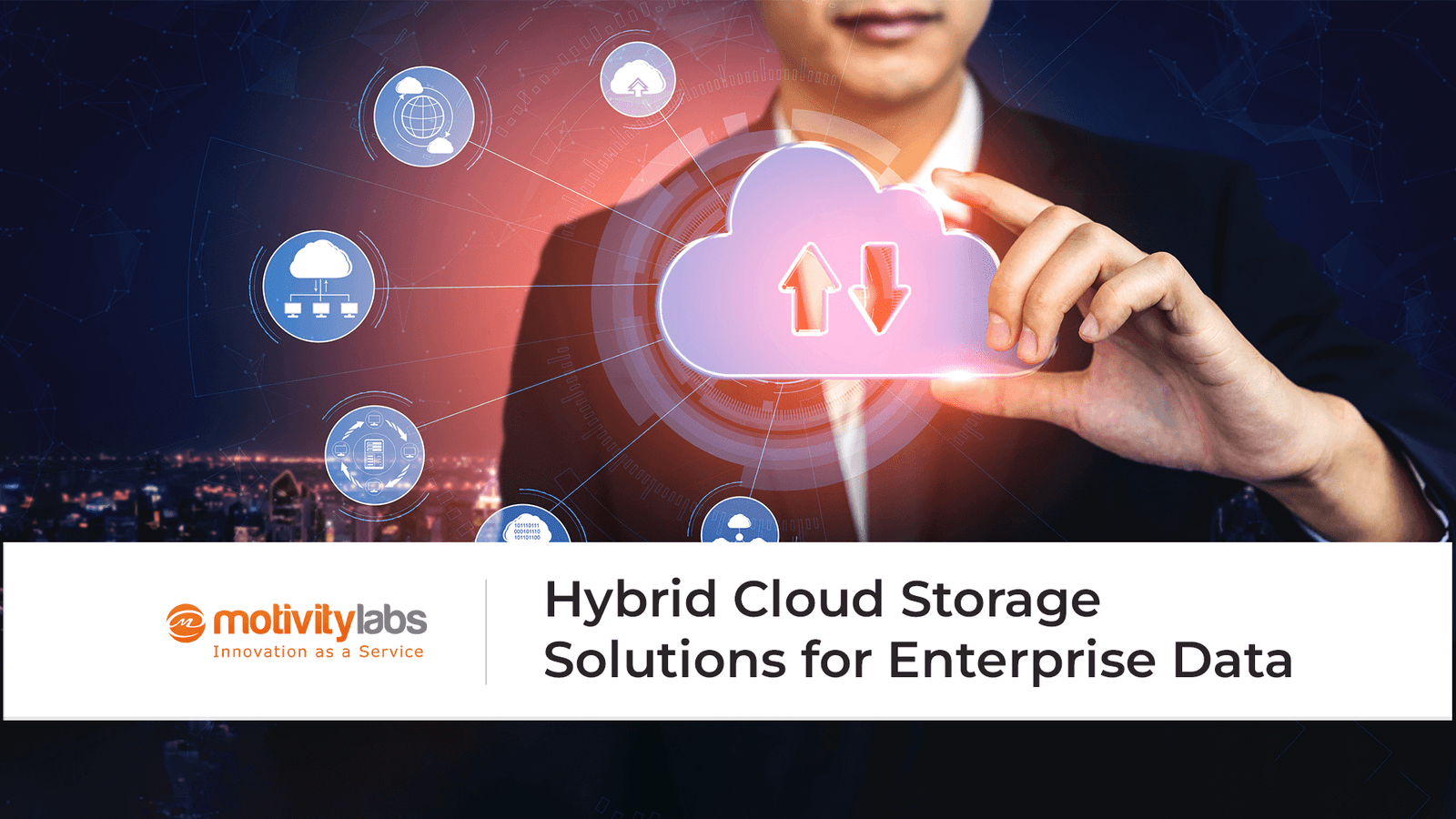Hybrid cloud storage solutions are becoming essential as data continues to grow across every enterprise. From customer records to real-time analytics, every business workflow relies on storage that is secure, accessible, and scalable. Organizations now generate massive volumes of data across geographies, departments, and platforms. Managing this data efficiently and in compliance with industry standards presents a serious challenge, even for the most advanced IT teams.
These solutions offer a practical and strategic path forward. They combine the scalability of public cloud infrastructure with the control and security of on-premises systems. Enterprises achieve flexibility while maintaining governance and deliver high performance without compromising on compliance. They also achieve agility with resilience through a unified architecture.
The Rise of Hybrid Cloud Storage
The shift to a hybrid cloud is not just a trend. It is a necessity. According to a Statista report, over 70 percent of organizations worldwide already use or plan to use hybrid cloud models in their IT operations. This change reflects the growing demand for tailored storage strategies that align with evolving workloads.
Businesses no longer view cloud storage as a one-size-fits-all solution. Some data must remain on-site for compliance or latency reasons. Other data requires the elasticity and global accessibility of the public cloud. Hybrid cloud storage delivers that balance.
What Are Hybrid Cloud Storage Solutions?
Hybrid cloud storage blends private and public cloud environments into a unified architecture. Data moves freely between environments based on performance, cost, and policy requirements. Sensitive data stays on-premises. Less critical data shifts to the cloud for scalability and availability.
- The key features of hybrid cloud storage solutions include:
Centralized data management - Unified access across cloud and local infrastructure
- Policy-driven data tiering
- Encryption and access control
- Real-time sync and backup
- Support for structured and unstructured data
Key Benefits for Enterprises
Enterprises need storage solutions that adapt to growing demands without compromising performance or control. Hybrid cloud storage solutions meet these needs by offering a flexible, secure, and cost-effective approach. Below are the key benefits driving their adoption:
Scalability on Demand
Hybrid cloud storage solutions enable enterprises to scale rapidly as data demands increase. This eliminates the need for additional investment in on-premise hardware. Storage capacity expands as business needs evolve. Seasonal workloads, data spikes, or expansion into new markets no longer require costly infrastructure changes.
Improved Data Governance
Enterprises are required to meet strict compliance standards such as GDPR, HIPAA, and PCI DSS. Hybrid cloud models support these frameworks by allowing sensitive data to remain within controlled environments. Data residency, auditing, and access policies can be enforced without limiting agility.
Cost Optimization
Storing all data in-house leads to capacity issues and higher maintenance costs. Moving particular workloads or archives to the cloud reduces capital expenditure. Hybrid models let businesses choose the most cost-effective storage option per workload. Data archiving, disaster recovery, and backups become more efficient.
Business Continuity and Disaster Recovery
Hybrid cloud environments offer strong backup and recovery options. In the event of system failure or cyber-attack, data can be restored quickly from the cloud. This minimizes downtime and protects business continuity.
Performance and Latency Control
Time-sensitive applications benefit from on-premise storage. Latency-sensitive data, such as real-time transactions or local machine operations, stays local. Large datasets used for analytics or AI workloads can reside in the cloud without affecting system responsiveness.
Unified Visibility
Centralized dashboards allow IT teams to monitor all storage environments from one place. They gain visibility into usage patterns, data movement, security status, and system health. This streamlines operations and enhances control.
Real-World Use Cases
Hybrid cloud storage solutions serve various industries with complex data demands. From compliance-heavy sectors to fast-paced digital environments, these solutions offer tailored benefits.
Here are some real-world use cases that highlight their impact:
Financial Services
Banks and insurance firms are required to retain data securely and adhere to strict regulatory standards. Hybrid cloud storage keeps confidential data on-premises while using cloud storage for analytics and customer engagement. The result is faster service delivery with no compromise on compliance.
Healthcare
Medical institutions manage electronic health records, imaging files, and compliance logs. Hybrid models allow them to store patient data securely on local servers while leveraging cloud-based AI tools for diagnostics or research. This ensures both privacy and innovation.
Retail
Retailers manage inventory, customer data, and real-time sales tracking. Hybrid storage supports omnichannel strategies by syncing data across stores, warehouses, and e-commerce platforms. It also powers demand forecasting and supply chain optimization.
Manufacturing
Factories and industrial operations rely on IoT data, production logs, and real-time monitoring. Hybrid storage enables fast, local processing of machine data while archiving historical logs in the cloud. This balances speed with storage efficiency.
Media and Entertainment
Content creators store massive video files and collaborate globally. Hybrid models allow immediate access to editing files locally while archiving completed projects on the cloud. This improves production timelines and reduces storage costs.
Challenges and Considerations
Despite its advantages, implementing hybrid cloud storage comes with challenges. Enterprises must carefully plan integration, security, and governance models.
Data Syncing: Ensuring consistent data across environments requires robust synchronization tools.
Security Risks: Multi-environment storage increases attack surfaces. Encryption, access management, and monitoring tools become essential.
Vendor Lock-In: Proprietary solutions can limit flexibility, making future migration or system integration more difficult.
Management Complexity: Managing on-premises and cloud environments adds administrative overhead without centralized tools.
Choosing a suitable architecture, tools, and cloud partners helps mitigate these risks.
Choosing the Right Hybrid Cloud Storage Strategy
The success of hybrid cloud storage depends on a strategy aligned with business needs. Consider the following factors:
Workload Type: Identify which data benefits from cloud storage versus what must remain local.
Compliance Requirements: Assess industry regulations to understand their impact on data storage, location, and control requirements.
Budget Planning: Assess the total cost of ownership for hybrid models, including infrastructure, support, and bandwidth.
Scalability Goals: Ensure the system can handle future growth without disruption.
Integration Flexibility: Choose solutions that integrate with your current applications, databases, and monitoring systems.
Vendor Neutrality: Prioritize platforms that support multiple clouds and avoid lock-in.
Enterprises that develop a tailored strategy maximize the impact of hybrid cloud investments.
The Future of Enterprise Storage
Hybrid cloud storage will continue to evolve as data needs grow. Future trends point to:
- Edge and Hybrid Integration: More organizations will combine hybrid storage with edge computing for real-time insights.
- AI and Automation: Storage systems will leverage AI to manage data placement, redundancy, and recovery.
- Zero Trust Security: Security frameworks will shift to zero trust models, strengthening hybrid environments.
- Multi-Cloud Management: Enterprises will unify storage across multiple cloud providers with policy-driven orchestration.
Hybrid models position enterprises for resilience, innovation, and agility. The flexibility to scale, secure, and optimize data across environments supports digital transformation across industries.
Motivity Labs: Empowering Enterprises with Hybrid Cloud Expertise
Motivity Labs delivers cutting-edge hybrid cloud storage solutions tailored to enterprise needs. Its cloud experts help businesses design, deploy, and manage hybrid storage architectures that are secure, scalable, and cost-effective. From cloud migration to storage optimization, Motivity Labs supports every stage of the hybrid cloud journey with proven frameworks and modern tools.
Enterprises partner with Motivity Labs to simplify complexity, enhance performance, and future-proof their data infrastructure. With deep expertise across cloud platforms and industries, Motivity Labs turns storage challenges into opportunities for innovation.



